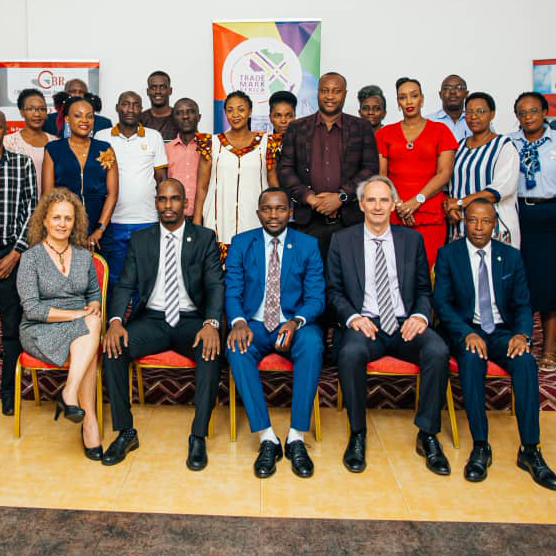
News
Burundi Explores Digitalization of Export procedures with Support from ASYCUDA Programme and TradeMark Africa

BUJUMBURA, May 2025 — ASYCUDA Program took part in a recent workshop held in Bujumbura aimed at assessing the feasibility of digitalizing key export procedures in Burundi. The event was organised by TradeMark Africa (TMA) under the UGUSHORA Project, which is funded by the Embassy of the Kingdom of the Netherlands. The workshop brought together public and private stakeholders to identify the main procedures to be dematerialized in order to improve the country’s trade through digital tools.
Representing ASYCUDA Program were its Francophone Africa Regional Coordinator and a customs expert. Their participation reinforced the programme’s ongoing technical engagement in East Africa, supporting partner countries in exploring digital solutions to streamline international trade.
The UGUSHORA Project focuses on strengthening Burundi’s export-oriented agricultural value chains, particularly in sectors such as horticulture, fisheries, and essential oils. It aims to attract investment, improve the business climate, and reduce trade barriers by promoting compliance with international standards. Within this framework, TMA and ASYCUDA are expected to work closely with the national administration and private sector actors to map export procedures that could be digitalized to enhance efficiency and transparency.
During the workshop, participants discussed various challenges that exporters face, particularly small and medium-sized enterprises operating in agricultural value chains. The event served to identify two core areas for potential digitalization: the issuance of Sanitary and Phytosanitary (SPS) certificates by the Ministry of Agriculture, and the conformity certificates delivered by the Burundi Bureau of Standards (BBN). These documents are essential for exporters to demonstrate compliance with safety and quality requirements when accessing international markets.
The identification of these priority areas marks an important step toward future collaboration. Technical discussions will continue to assess the feasibility of integrating these processes into Burundi’s existing ASYCUDA platforms, such as ASYCUDAWorld and the Single Window, through potential new modules or system enhancements, subject to national approval, resource mobilisation, and stakeholder coordination.
ASYCUDA Programme’s presence at the workshop contributed to the overall effort to ensure that any future digital solutions are technically sound, aligned with international best practices, and compatible with existing custom system. The approach remains country-led and inclusive, with an emphasis on simplifying trade procedures without compromising regulatory controls.
As Burundi explores the next steps in its trade digitalization journey, this workshop provided a timely opportunity to align partners, gather insights, and build a shared vision for more efficient and equitable export procedures.
BUJUMBURA, May 2025 — ASYCUDA Program took part in a recent workshop held in Bujumbura aimed at assessing the feasibility of digitalizing key export procedures in Burundi. The event was organised by TradeMark Africa (TMA) under the UGUSHORA Project, which is funded by the Embassy of the Kingdom of the Netherlands. The workshop brought together public and private stakeholders to identify the main procedures to be dematerialized in order to improve the country’s trade through digital tools.
Representing ASYCUDA Program were its Francophone Africa Regional Coordinator and a customs expert. Their participation reinforced the programme’s ongoing technical engagement in East Africa, supporting partner countries in exploring digital solutions to streamline international trade.
The UGUSHORA Project focuses on strengthening Burundi’s export-oriented agricultural value chains, particularly in sectors such as horticulture, fisheries, and essential oils. It aims to attract investment, improve the business climate, and reduce trade barriers by promoting compliance with international standards. Within this framework, TMA and ASYCUDA are expected to work closely with the national administration and private sector actors to map export procedures that could be digitalized to enhance efficiency and transparency.
During the workshop, participants discussed various challenges that exporters face, particularly small and medium-sized enterprises operating in agricultural value chains. The event served to identify two core areas for potential digitalization: the issuance of Sanitary and Phytosanitary (SPS) certificates by the Ministry of Agriculture, and the conformity certificates delivered by the Burundi Bureau of Standards (BBN). These documents are essential for exporters to demonstrate compliance with safety and quality requirements when accessing international markets.
The identification of these priority areas marks an important step toward future collaboration. Technical discussions will continue to assess the feasibility of integrating these processes into Burundi’s existing ASYCUDA platforms, such as ASYCUDAWorld and the Single Window, through potential new modules or system enhancements, subject to national approval, resource mobilisation, and stakeholder coordination.
ASYCUDA Programme’s presence at the workshop contributed to the overall effort to ensure that any future digital solutions are technically sound, aligned with international best practices, and compatible with existing custom system. The approach remains country-led and inclusive, with an emphasis on simplifying trade procedures without compromising regulatory controls.
As Burundi explores the next steps in its trade digitalization journey, this workshop provided a timely opportunity to align partners, gather insights, and build a shared vision for more efficient and equitable export procedures.




